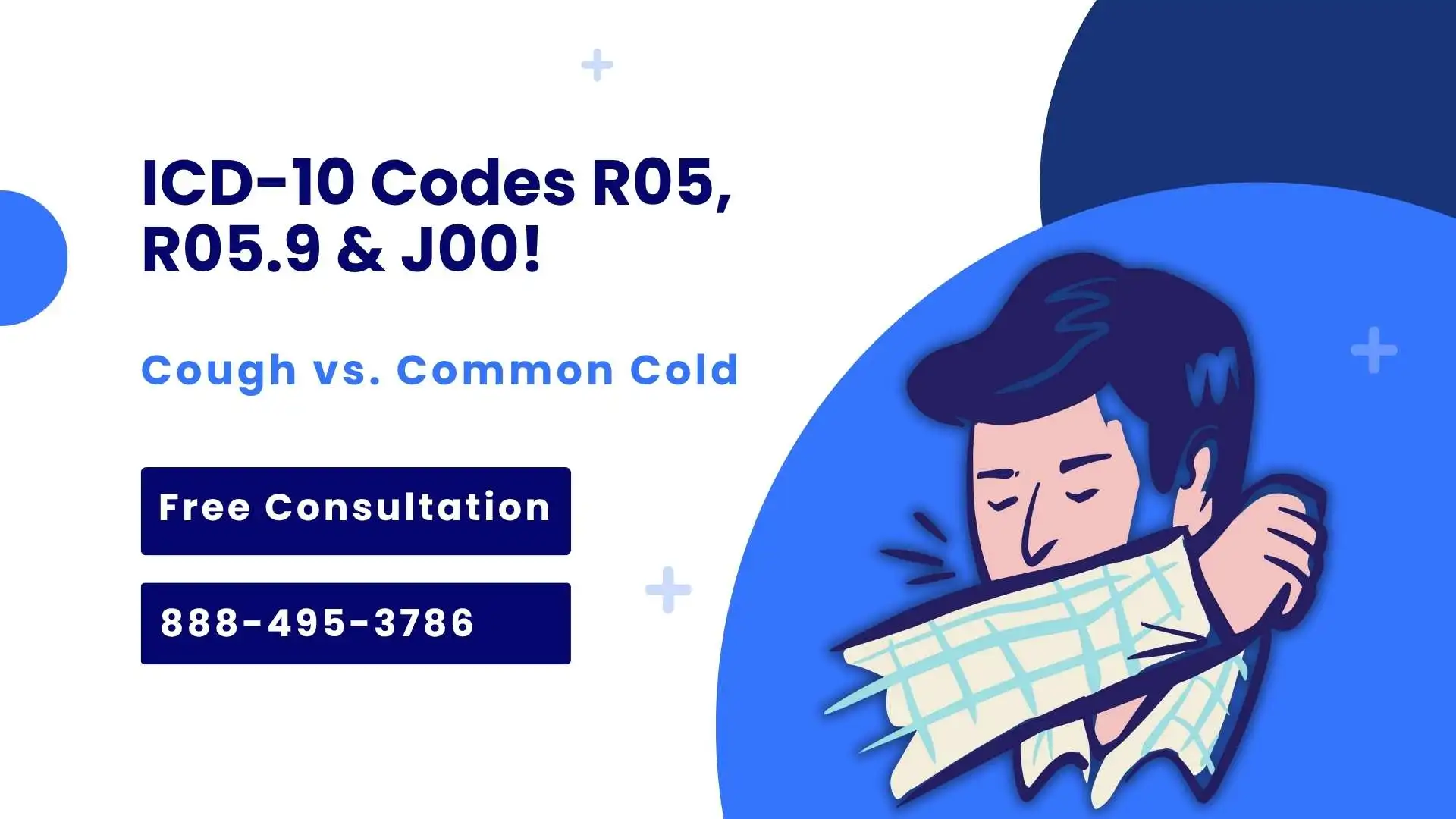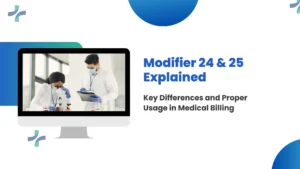The Hidden Complexity Behind a Simple Cough
In the U.S., more than 30 million outpatient visits annually are caused by cough-associated symptoms. It is a frequent motive why patients come to medical care, but after every harmless cough, there might be a complicated medical billing history. Selecting the right ICD-10 code, such as R05, R05.9, or even J00, is not a formality on the part of the provider. Correct reimbursement, compliance, and revenue cycle management that run smoothly are all dependent on it.
In this article, we are going to indulge ourselves in the delicate nature of cough-specific ICD-10 codes, the distinction between cough and common cold symptoms, and a knowledge base to give healthcare providers, coders, and billers that can result in an expensive mistake.
A Quick Look: What Do R05, R05.9 & J00 Mean?
- R05: Cough (general code)
- R05.9: Unspecified cough
- J00: New nasopharyngeal angina (common cold)
It is important to know the thin line comprising these codes. Claims rejection, underpayment, or even an audit could result from invalid coding.
A pediatrician, Dr. Lisa, in Ohio, placed a claim on a child with a blocked nose, dry cough, and sore throat with R05 (cough). The denial was based on the fact that documentation indicated acute nasopharyngitis (J00). This one incorrect code resulted in several weeks of going back and forth with the payer, and over $300 had to wait to be paid on a routine office visit.
The claim would have been reimbursed within 7-10 days with the right J00 ICD 10. It is not only the question of being correct but the question of the fast speed, compliance, and revenue flow.
Understanding the Cough Codes (R05, R05.9, R05.1)
R05 – Cough (General Code)
When the documentation mentions a cough with few clinical details, then the default ICD-10 code is R05. It deals with a broad spectrum of cough symptoms and tends to be employed in outpatients where the patient has a cough as the predominant issue of concern. It does not define time duration, type (dry or productive), or the causative factor, which makes it a widely applied code, particularly in cases involving viral agents as the cause.
Use it when:
- The provider has written only the word cottage without any qualifications.
- Nothing is said about duration (acute or chronic).
- The patient denies other cough descriptions (e.g., dry, wet, persistent), which are important for accurate ICD-10-CM coding.
- You are in a test drive or referral for further diagnosis.
R05.9 – Cough, Unspecified
R05.9 is a narrower subtype of R05 with the purpose of indicating the insufficiency of the documentation to identify a more precise code. It can be applied frequently in cases when cough is a side effect or is mentioned very briefly in the chart with no apparent reasoning about the causes, type, and time.
Use it when:
- The provider records only a cough with no description and differentials.
- It does not indicate whether it is dry, productive, or chronic.
- The difficulty in cough is not the key issue, but also pertinent to the problem of the patient.
- There is not enough clinical information to support a more precise designation, like R05.1 or R05.3.
R05.1 – Acute Cough
R05.1 is the ICD-10 classification of acute cough; it is a cough that is not more than three weeks old. The provider should take note of the fact that he or she should make use of the term acute in the documentation to be able to attribute this code. The latter code is particularly applicable in the event of a new onset cough, which is related to illness such as a viral infection or short-term exposure to irritants.
Use it when:
- The provider makes it clear that the cough is acute or has just started.
- It lasts less than 3 weeks and is probably self-limiting.
- The cough is not related to chronic disease conditions or long-term familial respiratory problems.
- To have proper claim routing, you must differentiate it from chronic or persistent types.
The J00 Code: It’s Not Just a Cold
J00 – Acute Nasopharyngitis (Common Cold)
Code J00 of ICD-10 is about acute nasopharyngitis of which common people often refer to as the common cold. It is typically caused by a viral illness, the rhinovirus in the large majority of cases, and it also spreads through the nasal passages and the throat. Runny nose, nasal congestion, sneezing, mild cough, and sore throat are the expected manifestations in the patients. Although it is a self-limiting condition, proper coding helps to avoid confusion in discernment between an isolated cough and a severe upper respiratory infection.
Use it when:
- The record indicates specifically one of the terms of common cold, acute nasopharyngitis, or viral URI, along with other symptoms.
- The patient experiences an amalgamation of coughing, rhinorrhea (runny nose), sore throat, and nasal stuffiness.
- The symptoms are mild and of recent onset and are not bacterial infections, such as strep or sinusitis.
- The cough constitutes a secondary problem to an extended upper respiratory infection.
ICD-10 Coding for Specific Cough Types
| Symptom Presentation | Likely ICD-10 Code | Notes |
| Dry cough only | R05.1 | “Dry cough” must be documented |
| Chronic cough | R05.3 | >8 weeks duration |
| Productive cough | R05.2 | Mucus/sputum must be noted |
| Cough in pregnancy | O99.89 + R05 | Use both codes |
| Viral URI with cough | J00 + R05 | Combo code scenario |
| Post-viral cough | B34.9 + R05 | May use “post-viral” indicator |
| Nasal congestion | R09.81 | Add-on code |
| Chest congestion | R09.89 | Supportive symptom |
Is your clinic fed up with rejections because of nonspecific diagnosis codes such as R05.9 or improper use of J00? Let a renowned Medical Billing & Coding Company like Providers Care Billing LLC come in.
📞 Call Now: 888-495-3786
📧 Email: Info@providerscarebilling.com
Call us now to prevent rejected claims and maximize your income.
Clinical Insight: Why Choosing the Right Code Matters
- The difference between R05, R05.9, and J00 is not altogether semantic. It impacts:
- Payee receipt and Payer acknowledgements
- Clinical documentation improvement (CDI)
- The workflows of Revenue Cycle Management (RCM)
- Lack of documentation, as in the case of describing symptoms such as chest congestion, productive cough, or rhinovirus without coding them correctly, equals delay to Medical Billing Companies like Providers Care Billing LLC.
In older adults, symptoms like cough or cold may sometimes overlap with cognitive issues—making it crucial to also recognize signs of unspecified dementia coded as F03.90.
Final Thoughts
Attention to detail is everything in the world of medical billing and coding. Whether it’s a rhinovirus infection or a tickling throat, the appropriate ICD-10 code is R05, R05.9, or R05. 1 or J00 can be the difference between glory and denial of a claim. Investing in adequate documentation, wise coding practices, and an ideal billing partner, the provider can guarantee maximum reimbursement and minimum delays.
To get professional assistance with ICD-10 coding or medical billing services or to optimize your RCM, contact Providers Care Billing LLC: your healthcare revenue partner committed to optimization and compliance, with efficiency.
Frequently Asked Questions (FAQS)
1. What is the ICD 10 code for chronic cough?
The ICD-10 general code for cough is R05.
2. How does R05 differ with R05.9?
R05 is an unspecified cough code; R05.9 is specified in case there is no type or cause reported.
3. Am I allowed to charge J00 with R05?
Yes, when both cough and the symptoms of the viral URI are presented and described.
4. What is the ICD-10 rhinovirus?
Rhinovirus causes the common cold, use J00. In case of non-specification of the virus, use B34.9.





